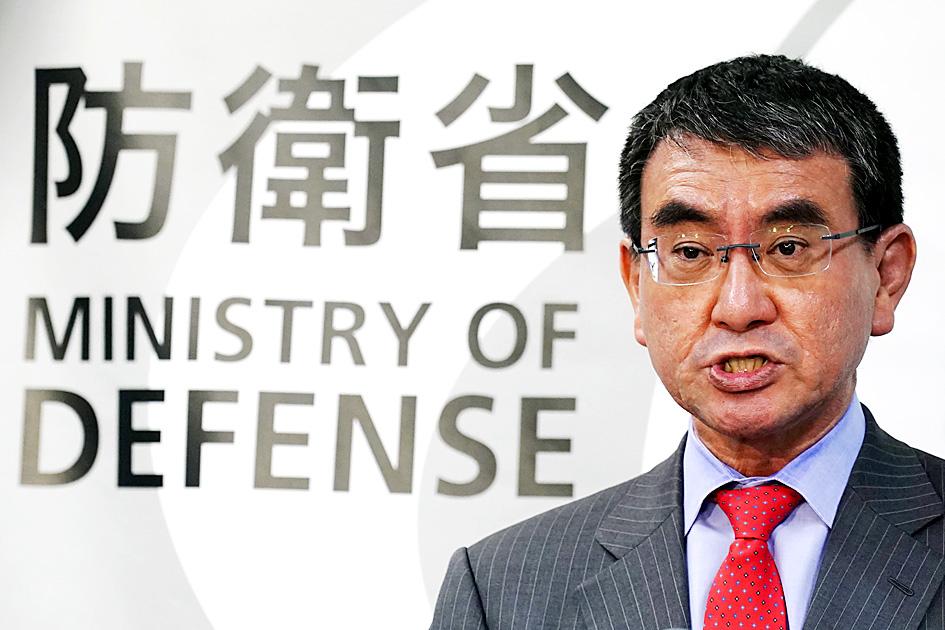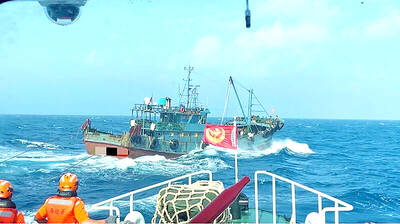Japan’s Maritime Self-defense Force on Friday conducted anti-submarine drills in the South China Sea, while China dispatched ships and planes to track a US Navy destroyer near the Paracel Islands (Xisha Islands, 西沙群島).
The Japanese Ministry of Defense said that three vessels, including a helicopter carrier and a submarine, were deployed to the South China Sea for the drill.
The purpose of the exercise was “to boost their tactical capability,” the ministry said in a statement, without giving more details.

Photo: AP
The three vessels would stop at Cam Ranh Bay, Vietnam, over the weekend to replenish supplies, the statement said.
Although Taiwan, Brunei, Malaysia, the Philippines and Vietnam claim parts of the South China Sea, nearly all of it is claimed by China, which has established military bases on artificial islands in the area.
China’s Global Times, noting the latest Japanese drills, yesterday said that the frequent conducting of military activities in the South China Sea is not conducive to the security and stability of the area, and is firmly opposed by Beijing.
The Global Times reported that Japanese warships had carried out activities in the South China Sea, with a helicopter carrier spotted on satellite on Monday last week.
The Chinese People’s Liberation Army (PLA) accused the USS John S. McCain of trespassing into Chinese territorial waters when the US Navy warship passed by the Paracel Islands on Friday during its latest freedom of navigation missions, aimed at defying China’s vast claims in the strategic waterway.
Beijing demands that the US end such actions, PLA Southern Theater Command spokesperson Colonel Zhang Nandong (張南東) said, calling them “blatant navigation hegemony and military provocation” that “seriously violated China’s sovereignty and security interests, and gravely jeopardized peace and stability in the South China Sea.”
“We urge the US side to immediately stop such kind of provocative actions, strictly manage and control its maritime and air military operations so as not to cause any eventuality,” Zhang was quoted as saying by the official Xinhua news agency.

The Ministry of the Interior (MOI) is to tighten rules for candidates running for public office, requiring them to declare that they do not hold a Chinese household registration or passport, and that they possess no other foreign citizenship. The requirement was set out in a draft amendment to the Enforcement Rules of the Public Officials Election and Recall Act (公職人員選舉罷免法 ) released by the ministry on Thursday. Under the proposal, candidates would need to make the declaration when submitting their registration forms, which would be published in the official election bulletin. The move follows the removal of several elected officials who were

The Republic of China (ROC) is celebrating its 114th Double Ten National Day today, featuring military parades and a variety of performances and speeches in front of the Presidential Office in Taipei. The Taiwan Taiko Association opened the celebrations with a 100-drummer performance, including young percussionists. As per tradition, an air force Mirage 2000 fighter jet flew over the Presidential Office as a part of the performance. The Honor Guards of the ROC and its marching band also heralded in a military parade. Students from Taichung's Shin Min High School then followed with a colorful performance using floral imagery to represent Taiwan's alternate name

COGNITIVE WARFARE: Chinese fishing boats transmitting fake identification signals are meant to test Taiwan’s responses to different kinds of perceived incursions, a report said Chinese vessels are transmitting fake signals in Taiwan’s waters as a form of cognitive warfare, testing Taipei’s responses to various types of incursions, a report by the Institute for the Study of War said on Friday. Several Chinese fishing vessels transmitted fake automatic identification system (AIS) signals in Taiwan’s waters last month, with one mimicking a Russian warship and another impersonating a Chinese law enforcement vessel, the report said. Citing data from Starboard Maritime Intelligence, the report said that throughout August and last month, the Chinese fishing boat Minshiyu 06718 (閩獅漁06718) sailed through the Taiwan Strait while intermittently transmitting its own AIS

CHINESE INFILTRATION: Medical logistics is a lifeline during wartime and the reported CCP links of a major logistics company present a national security threat, an expert said The government would bolster its security check system to prevent China from infiltrating the nation’s medical cold chain, a national security official said yesterday. The official, who wished to stay anonymous, made the remarks after the Chinese-language magazine Mirror Media (鏡周刊) reported that Pharma Logistics (嘉里醫藥物流) is in charge of the medical logistics of about half of the nation’s major hospitals, including National Taiwan University Hospital and Taipei Veterans General Hospital. The company’s parent, Kerry TJ Logistics Co (嘉里大榮物流), is associated with the National Committee of the Chinese People’s Political Consultative Conference (CPPCC) and the Chinese People’s Liberation Army (PLA), the